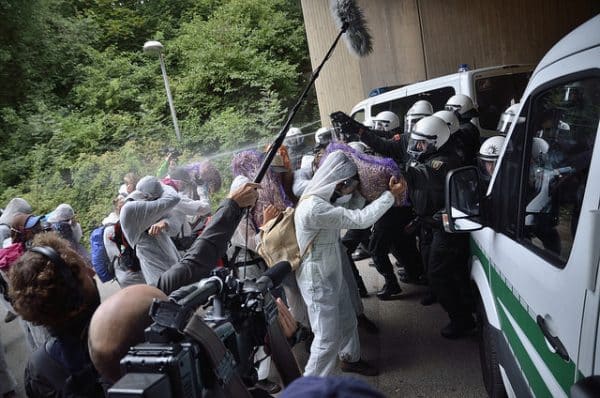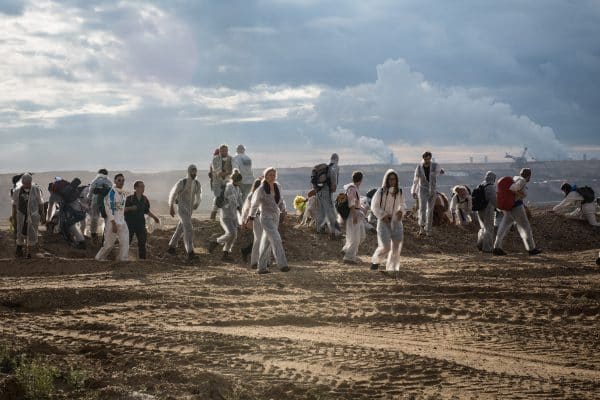Rising Tide of ‘Politically Acceptable’ Killings Spells Danger for Environmentalists Worldwide
FRONTLINE
NEWS—
Reports, News Flashes, and Commentary from Various Conflict Zones Around the Globe
HUMANITY IN TORMENT
=By= Nika Knight

Berta Zúñiga Cáceres, daughter of slain Indigenous environmental activist Berta Cáceres, held a vigil for her mother at OAS headquarters in Washington, D.C., in April. (Photo: Daniel Cima, via CIDH/flickr/cc)
More than three people were slain each week in 2015 for ‘protecting the land, forests, and rivers,’ a new report reveals
[dropcap]E[/dropcap]nvironmental activists are being murdered for their work in record numbers, a new report finds, as 2015 saw a stunning 185 people killed—more than three people each week—for resisting destructive industries and the exploitation of land and water.
The report (pdf) from U.K.-based human rights group Global Witness, titled “On Dangerous Ground,” found that “[a]s demand for products like timber, minerals and palm oil continues, governments, companies and criminal gangs are exploiting land with little regard for the people who live on it.”
“Increasingly, communities that take a stand are finding themselves in the firing line of companies’ private security, state forces and a thriving market for contract killers,” wrote the rights group.
The 2015 death toll marked a 59 percent increase from 2014, and represented more than double the number of journalists killed for their work that same year.
Mining and extractive industries were linked to the highest number of deaths, at 42.
 Killings by country in 2015. (Image: Global Witness)
Killings by country in 2015. (Image: Global Witness)
The deadliest countries for land defenders were Brazil (50 murders), the Philippines (33), and Colombia (29). Of the total, 67 victims were Indigenous people.
Global Witness also noted that because of the remote location of many of these vulnerable communities, the numbers presented in the report are likely an underestimation of the true global tally of activist deaths.
“For every killing we are able to document,” the group wrote, “others cannot be verified, or go unreported. And for every life lost, many more are blighted by ongoing violence, threats and discrimination.”
The report includes numerous first-hand accounts from activists threatened with violence because of their work.
“On September 1, at around 3am, the killers came,” Michelle Campos, land defender in the Philippines, told her story to Global Witness. “They woke the people up and forced them to gather in the basketball court. They prevented Tatay Emok from leaving… tied his hands and feet, slit his throat, shot his chest, and left him dead. They told us to leave our community in two days or else they will finish us all.”
“On September 1, at around 3am, the killers came. They woke the people up and forced them to gather in the basketball court. They prevented Tatay Emok from leaving… tied his hands and feet, slit his throat, shot his chest, and left him dead. They told us to leave our community in two days or else they will finish us all.” —Michelle Campos, land defender in the Philippines
Justice for the victims is scarce, Global Witness observed: “Across the world, collusion between state and corporate interests shield many of those responsible for the killings. In cases that are well documented we found 16 were related to paramilitary groups, 13 to the army, 11 to the police and 11 to private security—strongly implying state or company links to the killings. There was little evidence that the authorities either fully investigated the crimes, or took actions to bring the perpetrators to account.”
Moreover, the organization discovered another alarming trend: “while impunity for perpetrators prevails,” Global Witness wrote, “the criminalization of activists is becoming more commonplace, particularly in African countries. Governments and powerful business interests use their influence to marginalize defenders and turn public opinion against them, branding their actions as ‘anti-development.'”
“Killing has become politically acceptable to achieve economic goals,” the report quoted Felipe Milanez, former deputy editor of National Geographic Brazil, as saying. “I’ve never seen, working for the past 10 years in the Amazon, a situation so bad.”
The report was dedicated to Berta Cáceres, the Indigenous environmental activist in Honduras who organized her community against a proposed megadam project and was assassinated in March, a killing widely believed to be politically motivated. Her family and supporters have called for an independent investigation into her death, but their demands have thus far fallen on deaf ears.
Yet so many environment and land defenders, despite the mounting danger, are committed to their cause.
“It is necessary to defend the land, for us the poor people, because the land is our own bank. If we lose it we have lost the world,” said Sima Mattia, secretary of the Malen Land Owners and Users Association (MALOA) of Sierra Leone.
Global Witness called on the international community to combat the rising bloodshed, observing that “[p]rotecting land and environmental defenders is vital—not only as a matter of justice and basic human rights, but for our collective survival.”
This work is licensed under a Creative Commons Attribution-Share Alike 3.0 License
Source: CommonDreams.
=SUBSCRIBE TODAY! NOTHING TO LOSE, EVERYTHING TO GAIN.=
free • safe • invaluable
[email-subscribers namefield=”YES” desc=”” group=”Public”]






